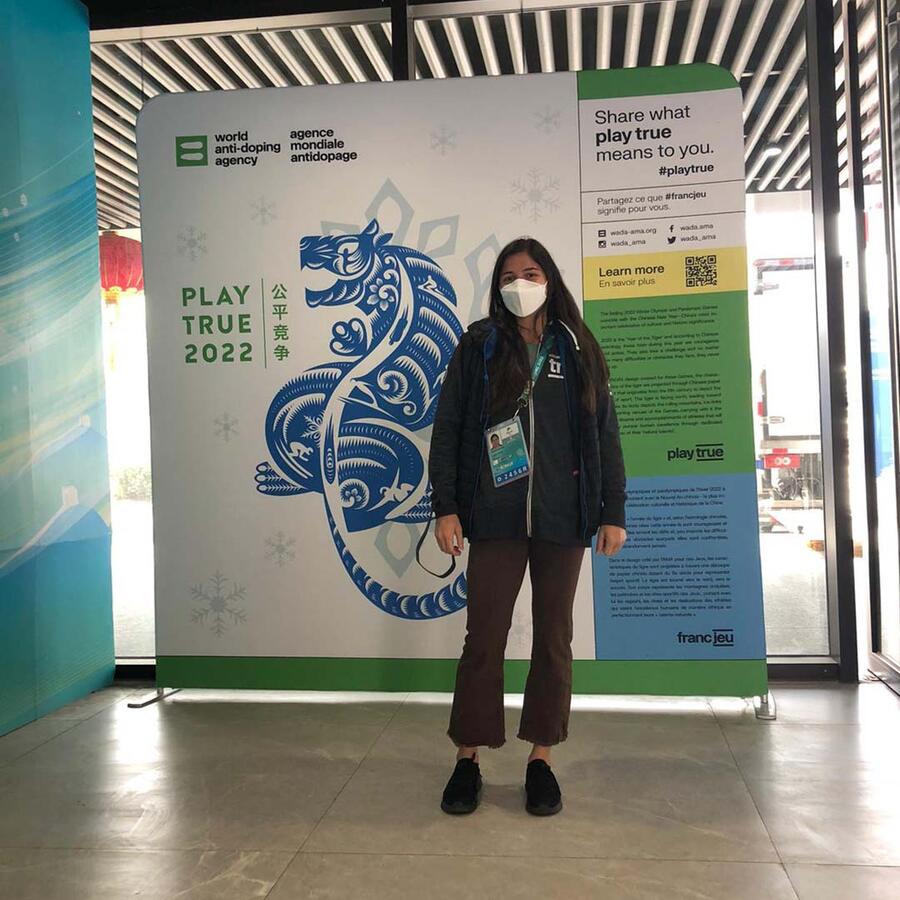Releases
WADA Athlete Committee member brings important perspective to Independent Observer team at Paralympics

Athlete representation is playing an increasingly important role in all aspects of sport in recent years, including anti-doping. At the Beijing 2022 Paralympic Winter Games that run until 13 March, one athlete in particular has been making a positive impact as part of the World Anti-Doping Agency’s (WADA’s) mission for doping-free sport.
Adriana Escobar, an elite rower and member of WADA’s Athlete Committee, is one of five experts* on the Independent Observer (IO) team, which is tasked with monitoring each phase of the anti-doping program and providing an independent assessment of all aspects of it.
Last year, the 29-year-old native of El Salvador was approached about becoming part of the IO team for Beijing 2022, an opportunity she said she immediately jumped at, as it was a chance for her to continue learning more about anti-doping and its processes while serving the interests of athletes.
Escobar said: “For me it is very important to compete in a fair and equal environment for everyone. As an athlete, anti-doping can seem quite complicated. It has been a really educational experience for me to learn more about all that anti-doping entails, from the very beginning to the end of the process.”
Communication is key
The IO program is one of several areas where WADA is providing support to the International Paralympic Committee (IPC) as it delivers the anti-doping program in Beijing. Escobar said the collaboration between the IO team and her IPC counterparts has been excellent from the outset, with IPC representatives available at all doping stations to answer any questions.
She added that the IPC team had also built a good rapport with the athletes, who have been highly favorable in their assessments of the anti-doping procedures conducted to this point.
She said: “I feel very happy with the processes that have been carried out, and so far, the athletes have only had positive comments about the delivery of the anti-doping program. Anti-doping can sometimes be a bit scary for athletes. But everyone, including the Doping Control Officers, have been excellent to the athletes, ensuring they feel safe, comfortable and well informed.”
A day in the life
As the sole member of WADA’s Athlete Committee on the IO team, monitoring the athletes’ experience during the anti-doping process is a key part of Escobar’s job. With more than 600 athletes competing in six sports across several different venues, the schedule for the IO team can certainly be taxing. This is doubly so for Escobar, who as a current athlete starts her days at around 5.30am to get a full hour-and-a-half gym session completed before even sitting down to breakfast to discuss the workday with her IO teammates.
After that, she said, the team visits the venues and doping control stations throughout the day, where they meet with the Doping Control Station Managers, check the logistics of the operations and observe the work being undertaken.
Escobar’s afterwork hours in Beijing have so far varied from watching the action (“I really enjoy this part, since I am not very familiar with Paralympic winter sports”), to doing still more physical training, taking online classes, or speaking with her family.
22 years of the IO program
WADA’s IO program, which has been running since the 2000 Olympic Games in Sydney, Australia, and has included more than 50 major events during that time, is an important element of WADA’s compliance monitoring of Major Event Organizations.
The IO team observes all aspects of the anti-doping program, including:
- Test distribution planning;
- Selection of competitors for testing;
- Notification of doping control;
- Therapeutic Use Exemption (TUE) procedures;
- Chain of custody;
- Sample analysis; and
- Results management.
The teams provide daily feedback with an eye to possible improvements that could be made, and also issue post-Games reports that will formalize recommendations for the IPC, the accredited laboratory, the organizing committee, and WADA – all designed to enhance anti-doping activities at future events.
Athletes first
For Escobar, who joined the WADA Athlete Committee in 2020, the Beijing 2022 Paralympic Winter Games have provided her with an invaluable opportunity to see anti-doping operations first-hand and also to make an important contribution from the athlete’s point of view.
She added: “I know that WADA works against doping and cares for the rights of athletes and it has been an incredible experience to actually be part of it. From the moment we arrived, all the team’s experts have assisted and worked towards making sure that all the processes are being done correctly, and that the athletes’ experience is a positive one.”
She cites the sample collection process as the area where she has learned the most and considers herself privileged to be able to ask the experts questions she has had for years. She added: “As a representative of the athletes, it has been particularly rewarding to see how happy they have been about all the testing procedures, controls, etc. up to this point. I think that ensuring the athletes feel as comfortable as possible is a very important aspect of the process.”
*The IO team is composed of:
- Shafag Huseynli (Azerbaijan), CEO, Azerbaijan National Anti-Doping Agency (Chair);
- Ilaria Baudo (Italy), Senior Manager, Testing, WADA (Vice-Chair);
- Mike Earl (United Kingdom), General Manager, Anti-Doping, World Rugby;
- Sameh Elray (Egypt), Manager, Africa Office, WADA; and
- Adriana Escobar (El Salvador), Member of WADA Athlete Committee, International rower.

